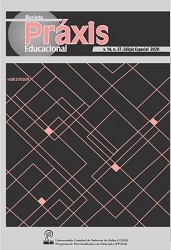PLAYING AS AN INCLUSION PROCESS IN PLAYFUL OCCUPATIONS IN THE CITY OF SÃO PAULO
DOI:
https://doi.org/10.22481/praxisedu.v16i37.5984Keywords:
Play, Playful Occupations, Public SpacesAbstract
The human being, through relations between their fellows and the universe surrounding them, created different ways of expressing itself. Games, toys and jokes are some of these expressions and have been present, in people´s lives, historically, in different social groups, ages and genders. Different meanings and significations have being attributed to these practices in accordance with the recreational culture. So, this paper analyzed the ludic experience as a cultural, social and historical manifestation. Faced with the unpredictability of playing and with the possibilities of inventive and creational spaces, we followed the actions of the project "Central dos Jogos" in the city of São Paulo. This was a socio-cultural project that had the mission to spread the culture of playing with the objective of promoting experiences capable of strengthening ties and re-signifying the public spaces. To achieve this purpose, the project promoted the realization of Ludic Occupations. Thus, this research, through the use of cartographic narratives, followed how different people made the public spaces, using games, toys and jokes during those Ludic Occupations.
Downloads
References
BARROS, Laura Pozzana de; KASTRUP, Virgínia. Cartografar é acompanhar processos. In: PASSOS, Eduardo; KASTRUP, Virgínia; ESCÓSSIA, Liliana da (org.) Pistas do método da cartografia. Porto Alegre: Sulina, 2010.
BERGSON, Henri. Mélanges. Paris: PUF, 1972.
COELHO, Jonas. Ser do tempo em Bergson, Interface - Comunicação, Saúde, Educação. v.8, n.15, p.233-46, mar/ago 2004. Disponível em: http://www.scielo.br/pdf/icse/v8n15/a04v8n15
BROUGÈRE, Gilles. Brinquedo e cultura. São Paulo, SP: Cortez, 1995.
CALVINO, Ítalo. As cidades invisíveis. São Paulo, SP: Companhia das Letras, 1990.
DEBORTOLI, José Alfredo Oliveira. Brincadeira. In GOMES, Christianne Luce (Org.) Dicionário crítico do lazer. Belo Horizonte: Autêntica, 2004. p. 19-24.
DELEUZE Gilles & GUATTARI, Félix. Mil Platôs: capitalismo e esquizofrenia. São Paulo: Ed. 34, vol. 1, 1995.
FRIEDMANN, Adriana. O universo simbólico da criança: olhares sensíveis para a infância. Petrópolis: Vozes, 2005.
HUIZINGA, Johan. Homo ludens: o jogo como elemento da cultura. 7 ed. São Paulo: Perspectiva, 2012.
KOHAN, Walter Omar. Infância: entre educação e filosofia. Belo Horizonte: Autêntica, 2003.
LARROSA, Jorge. Notas sobre a experiência e o saber de experiência. Revista Brasileira de Educação, n. 19, Jan./Fev./Mar./Abr. 2002. Disponível em: http://www.scielo.br/pdf/rbedu/n19/n19a02.pdf
LUCKESI, Cipriano Carlos. O lúdico na prática educativa. Tecnologia Educacional. Rio de Janeiro. Vol. 22, pág. 119-120. Jul/Out, 1994.
MATURANA, Humberto; VERDEN-ZÕLLER, Gerda. Amar e Brincar: Fundamentos esquecidos do humano do patriarcado à democracia. São Paulo: Palas Athena, 2004.
PELLEGRIN, Ana de. O Espaço de Lazer na Cidade e a Administração Municipal. In: MARCELLINO, Nelson Carvalho. (Org). Políticas Públicas Setoriais de Lazer: O papel das Prefeituras. Campinas-SP: Autores Associados, 1996. pgs. 31-38.
ROLNIK, Raquel. O que é a cidade. São Paulo: Brasiliense, 1994.
ROLNIK, Raquel. São Paulo. São Paulo: Publifolha, 2001.
ROLNIK, Raquel. O lazer humaniza o espaço urbano. In: SESC SP. (Org.). Lazer numa sociedade globalizada. São Paulo: SESC São Paulo/World Leisure, 2000.
ROLNIK, Suely. Cartografia sentimental: transformações contemporâneas do desejo. São Paulo: Liberdade, 1989.
SOLER, Reinaldo. Jogos cooperativos. Rio de Janeiro: Sprint, 2006.
SPINK, Peter. O pesquisador conversador no cotidiano. Psicologia & Sociedade. v. 20, Edição Especial, 2008. p.70-77. Disponível em: http://www.scielo.br/scielo.php?pid=S0102-71822008000400010&script=sci_abstract&tlng=pt
TAVARES, Regina Márcia Moura. Brinquedos e brincadeiras: patrimônio cultural da humanidade. Campinas: UNESCO, 2004.
Downloads
Published
How to Cite
Issue
Section
License
Você é livre para:
Compartilhar - copia e redistribui o material em qualquer meio ou formato; Adapte - remixe, transforme e construa a partir do material para qualquer propósito, mesmo comercialmente. Esta licença é aceitável para Obras Culturais Livres. O licenciante não pode revogar essas liberdades, desde que você siga os termos da licença.
Sob os seguintes termos:
Atribuição - você deve dar o crédito apropriado, fornecer um link para a licença e indicar se alguma alteração foi feita. Você pode fazer isso de qualquer maneira razoável, mas não de uma forma que sugira que você ou seu uso seja aprovado pelo licenciante.
Não há restrições adicionais - Você não pode aplicar termos legais ou medidas tecnológicas que restrinjam legalmente outros para fazer qualquer uso permitido pela licença.












